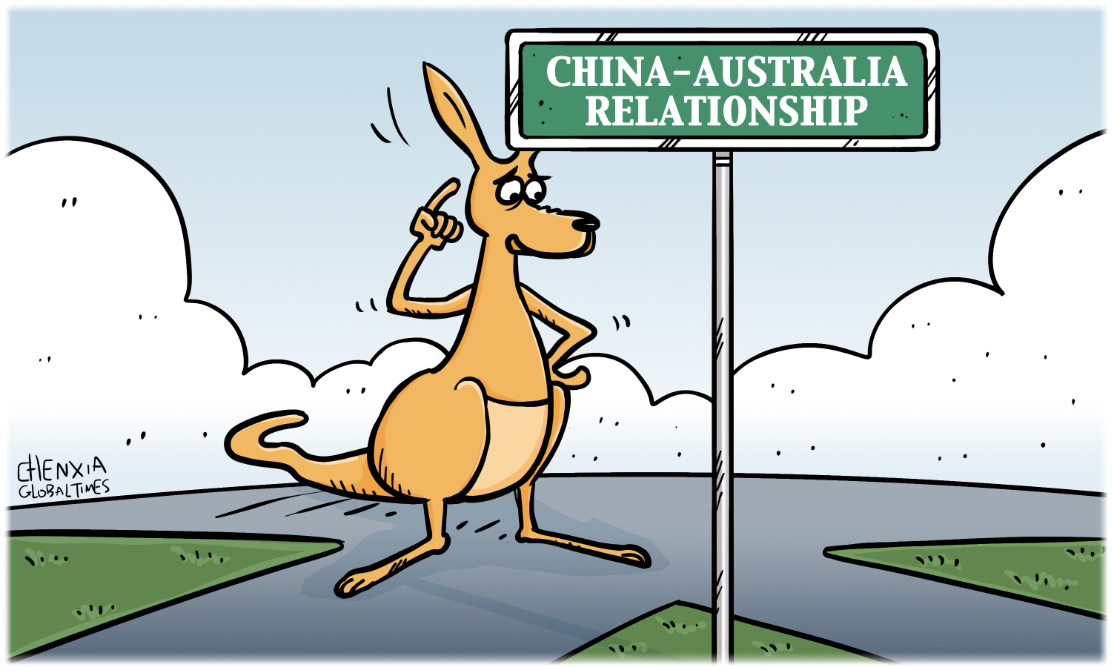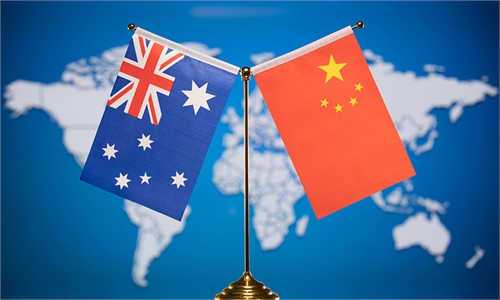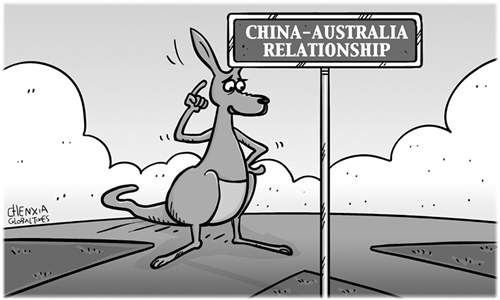Australia encouraged to 'seize common development' with China as trade minister sends signal of thaw

Illustration: Chen Xia/GT
Trade disputes between China and Australia should not be raised to a political level with a description like "sanctions," as China is always willing to discuss trade problems with Australia candidly, Chinese experts said, after Australian Trade Minister Don Farrell said Thursday that the country would be willing to reconsider its WTO complaint against China if Beijing lifted export "sanctions."
Australian media viewed Farrell's remark as a signal of a potential relations thaw after years of trade tension created by the Morrison government. Chinese experts said that Australia should seize the chance of common development with the world's second-largest economy while better balancing relations with the US.
In an interview with ABC radio, Farrell said he would be happy to visit China and talk with Chinese Commerce Minister Wang Wentao, to resolve trade disputes "through discussion rather than arbitration."
Barley, wine, meat and lobster are four main Australian products involved in export disputes with China over tariffs. Australia is pursuing complaints about Chinese tariffs in the WTO.
Farrell told The Australian newspaper that he would consider withdrawing complaints on the basis of "goodwill shown on both sides." He told ABC on Thursday that Australia would prefer to "sit down and discuss the issues" with the Chinese government.
Kicking the ball into China's court, Farrell told the media that "the signs are very positive" but "no official invitation has been issued from China."
China has not imposed any so-called "trade sanctions" on Australia. Individual cases of trade disputes should not be elevated to the political level, Chen Hong, director of the Australian Studies Centre at East China Normal University, told the Global Times on Thursday.
Canberra may be seeking leverage in future discussions with "sanctions" narratives, but China has always been very open and candid, and is willing to hold direct discussions with Australia on commercial and trade issues based on the facts, Chen said.
According to Bloomberg, China and Australia have been discussing Farrell's visit to China in the first half of 2023, as soon as in February. In fact, China-Australia relations have restarted in the past seven months since the Albanese administration took office in May.
Chinese President Xi Jinping met with Australian Prime Minister Anthony Albanese in Bali, Indonesia on November 15. On December 21, State Councilor and Foreign Minister Wang Yi held the sixth round of China-Australia Foreign and Strategic Dialogue with Australian Foreign Minister Penny Wong in Beijing.
The two sides agreed to maintain high-level engagement, and to commence or restart dialogue in areas including bilateral relations, the economy and trade, and regional and international issues. They also agreed to support people-to-people exchanges.
As long as the two sides can actively interact and manage differences, bilateral relations will recover and rebound to a new height, Chen said.
A thaw in ties is also a realistic demand for Canberra. Farrell told local media Nine's Today Show that it's in Australia's national interest for the relationship with China to improve and for any impediments that are there to be removed.
According to the latest Guardian Essential poll in December, 46 percent of respondents have a positive view of Albanese, 26 percent are neutral and 23 percent are negative. His Labor party is also leading in voter approval.
Restoring relations with China is a plus for the Albanese administration, said Chen, "in practical terms, he should consolidate this advantage, as China is the most capable of helping Australia out of its economic challenges."
Tourism and higher education are important pillars of the Australian economy. China is optimizing and adjusting epidemic response measures, which have completely removed obstacles for Chinese citizens to travel and study overseas.
Unlike the US, which requires COVID-19 tests for Chinese travelers, Albanese said on Thursday that Australia is making no change to rules allowing travelers from China to enter the country.
"Economy and trade are the driving forces for the development of China-Australia relations," Chen said. "Australia should seize the chance and seek common development with the world's second-largest economy."
Farrell's possible visit to China would be an occasion to implement the consensus reached by the leaders of the two countries, Chen said.
Nevertheless, analysts warned that Australia needs a more balanced approach to its alliance with the US and cooperation with China, as it is not hard to expect some of the rhetoric from Canberra would follow that of Washington against Beijing.
China-Australia relations will go through ups and downs, and Australia needs to understand that China will never accept provocations and damage to China's core interests, Chen said. "This is the bottom line."




